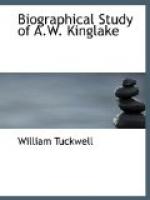Another of Kinglake’s life-long familiars was Charles Skirrow, Taxing Master in Chancery, with his accomplished wife, from whose memorable fish dinners at Greenwich he was seldom absent, adapting himself no less readily to their theatrical friends—the Bancrofts, Burnand, Toole, Irving—than to the literary set with which he was more habitually at home. He was religiously loyal to his friends, speaking of them with generous admiration, eagerly defending them when attacked. He lauded Butler Johnstone as the most gifted of the young men in the House of Commons; would not allow Bernal Osborne to be called untrue; “he offends people if you like, but he is never false or hollow.” A clever sobriquet fathered on him, burlesquing the monosyllabic names of a well-known diarist and official, he repelled indignantly. “He is my friend, and had I been guilty of the jeu, I should have broken two of my commandments; that which forbids my joking at a friend’s expense, and that which forbids my fashioning a play upon words.” He entreated Madame Novikoff to visit and cheer Charles Lever, dying at Trieste; deeply lamented Sir H. Bulwer’s death: “I used to think his a beautiful intellect, and he was wonderfully simpatico to me.” But he was shy of condoling with bereaved mourners, believing words used on such occasions to be utterly untrue. He loved to include husband and wife in the same meed of admiration, as in the case of Dean Stanley and Lady Augusta, or of Sir Robert and Lady Emily Peel. Peel, he said, has the radiant quality not easy to describe; Lady Emily is always beauteous, bright, attractive. Lord Stanhope he praised as a historian, paying him the equivocal compliment that his books were much better than his conversation. So, too, he qualified his admiration of Lady Ashburton, dwelling on her beauty, silver voice, ready enthusiasm apt to disperse itself by flying at too many objects.
He was wont to speak admiringly of Lord Acton, relating how, a Roman Catholic, yet respecting enlightenment and devoted to books, he once set up and edited a “Quarterly Review,” with a notion of reconciling the Light and the Dark as well as he could; but the “Prince of Darkness, the Pope,” interposed, and ordered him to stop the “Review.” He was compelled to obey; not, he told people, on any religious ground, but because relations and others would have made his life a bore to him if he had been contumacious against the Holy Father.




